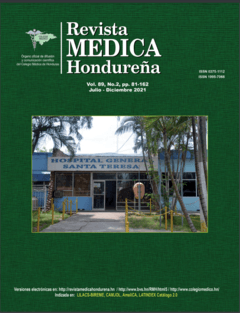Assessment scale of the deterioration of the hospitalized pediatric oncological patient, Hospital Escuela, Tegucigalpa, 2017-2019
DOI:
https://doi.org/10.5377/rmh.v89i2.13017Keywords:
Alerta temprana, Deterioro clínico, PediatríaAbstract
Background: The validation process of a pediatric early warning system for risk prediction of deterioration events must be carried out in each institution. Objective: To determine if the Early Warning Assessment Scale for Honduras (EVATH) has predictive utility for deterioration events in hospitalized pediatric cancer patients. Methods: Case-control study carried out in the Pediatric Hemato-Oncology Room, Hospital Escuela, May 2017 to May 2019 that included a case group, patients who presented a deterioration event (44) and a control group, patients without de-terioration event (88). EVATH score/category was used Low risk 0-2, Moderate risk 3-4 and High risk ≥5. Results: Age 7-12 years 43.1% (19/44) case group and 2-6 years 34.1% (30/88) controls.Male 61.4% (27/44) were case group and female 52.3% (46/88) control. The diagnosis was Acute Lymphoblastic Leukemia, case group 50.0% (22/44) and controls 61.4% (54/88). The condition of egress was alive in the case group in 75% (33/44) and 100.0% (88/88) for controls. Deaths occurred in the case group 25% (11/44), (IC95% 13.2-40.3). The risk classification according to EVATH low risk 31.8% (14/44) in case group and 100.0% (88/88) in controls. Discussion. Predictive utility of the deterioration event was identified using risk stratification into categories (AUC-ROC = 0.841; 95% CI 0.755-0.927) or using only the score (AUC-ROC = 0.860; 95% CI 0.776-0.943). The cut-off point of the EVATH was demonstrated in the score ≥3 with sensitivity of 68.2% (95% CI: 53.3-83.08) and specificity of 100% (95% CI 99.4-100) with NPV 86.8% (95%CI 79.1-93.4).
Downloads
718




